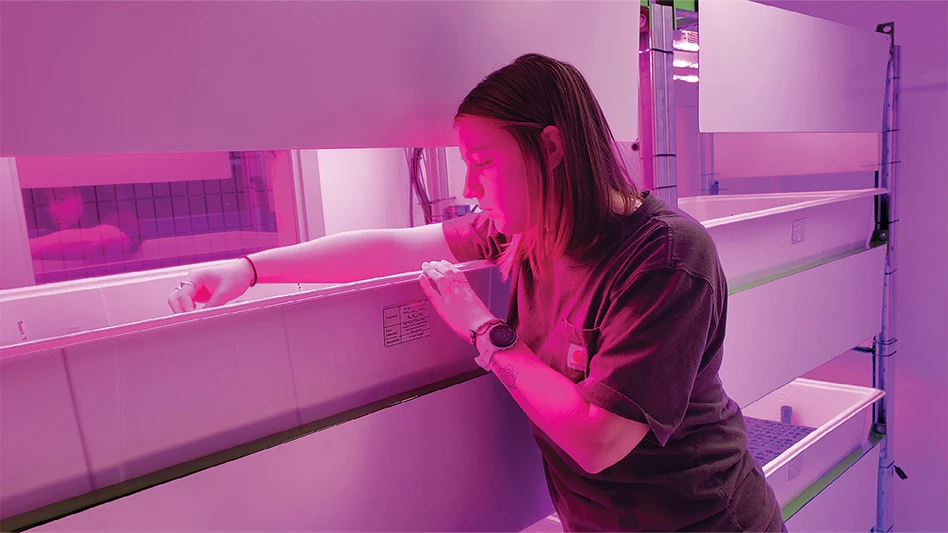
Photo courtesy of Jessica Lowery
SPONSORED BY BASF
With more than 500 acres of production space and 55 acres of it under cover, Creekside Nursery in Hempstead, Texas, grows ornamentals as small as four-inch annual trays and as large as 200-gallon trees, says production manager Jessica Lowery.
It produces everything else under the sun — and in its greenhouses — from perennials, cacti and succulents to groundcovers, roses and shrubs, Lowery adds.
“We're growing mainly landscape material for the Texas market, but we do have quite a few specialty retail-type items we offer also,” she says.
In addition to managing approximately 250 employees in the fields and being one of five growers, Lowery oversees the propagation department. She and her staff perform all of their own propagation, mostly from onsite materials, but sometimes from brokered-in cuttings and bare-root product from around the U.S. and from Central America.
Like at any other greenhouse or nursery, plant diseases are a fact of life at Creekside, with common bad actors such as Rhizoctonia, Pythium or Phytophthora posing risks and making the occasional guest appearance. Luckily, Lowery and her staff are prepared to defend Creekside. They prevent soilborne, root and crown diseases from showing up with Empress® Intrinsic® brand fungicide, a broad-spectrum fungicide from BASF.
“We've been using Empress fungicide since it first came to market [in 2013],” Lowery says. “We had already had experience with the same active with another BASF product … Pageant® Intrinsic brand fungicide. So, we felt confident in utilizing what Empress had to offer.”
Creekside Nursery grows annuals, perennials, cacti, succulents, groundcovers, roses, shrubs and trees.
When Creekside brokers in and plants material, it preventatively treats it with Empress fungicide before any other product. “So, there are some crops that we know might get that Phytophthora or crown rot, and they stay clean throughout their whole cycle,” Lowery says. “And hopefully, that was due to the application of Empress.”
Other areas in the nursery also use Empress fungicide on brokered-in material, according to Lowery, as well as to initiate root growth.
“Empress provides a pretty effective part of our rotational strategy,” she says. “It really fits our disease management and spray endurance programs. We are growing a wide variety of material in very large quantities, so prevention is key for us. So, working to keep those soilborne diseases under control preventatively is much easier to manage than having to apply fungicide securing them. So, Empress fungicide helps us start our crops out as clean as possible, and it's performed very consistently for us.”
The propagation department at Creekside has its own spray program, and it sprays crops weekly, Lowery says. Once crops leave the department, they will be transplanted and be incorporated into other spray programs where they are sprayed about once every two weeks.
Working at such a large nursery, Lowery says she and her staff in the propagation department need to do their part to meet production goals. “Plants in propagation are essentially the future of our business, so if the plants coming out of prop to go to transplant are not clean, we could possibly spread diseases within our own footprint and have a much larger problem to battle,” she says.
While spray programs at Creekside are based on prevention, sometimes curative applications are necessary, Lowery says. “Say we get an infestation of something we weren't expecting, then we'll switch up the chemistries a little bit or change the rates to try to tackle what's going on with our materials,” she says.
In addition, Creekside rotates modes of action to avoid resistance and introduces new products to that rotation, Lowery says. For instance, it also uses the BASF fungicides Orvego® and Stature®.
Disease control can be tricky business, but Lowery has a simple tip for growers.
“Some advice to other growers would be just keep your eyes open,” she says. “Changing weather patterns make it pretty difficult to manage disease prevention, so we try to stay ahead preventatively as much as we can using products like Empress, because they help put up a strong defense against plant-damaging stress, so that will hopefully result in a higher crop yield.”
Latest from Greenhouse Management
- USDA fires experts on invasive pests, including Asian citrus psyllid, chilli thrips
- CEA Alliance celebrates bipartisan introduction of Supporting Innovation in Agriculture Act
- Dümmen Orange North America celebrating 25th anniversary in 2025
- CEA HERB Part 1: Best management practices for culinary herbs
- Lawsuit challenges new H-2 visa rules
- CEA HERB Part 2: A guide to increasing the sowing density of culinary herbs
- Illinois Landscape Contractors Association changes name to Landscape Illinois
- 2025 Proven Winners Horticulture Scholarship applications now open







